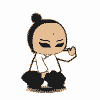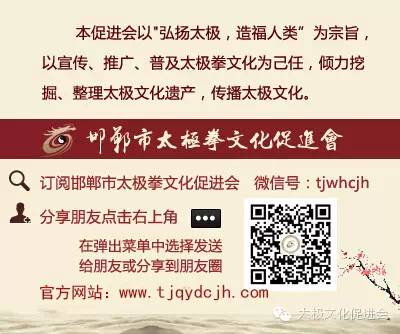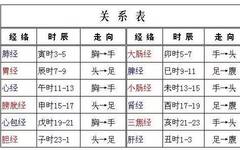
When it comes to meridians, many people have seen them in television shows or martial arts novels, such as the Ren and Du meridians, the smoke rising from the head during practice, the Qi sinking to the Dantian, and the crying and laughing acupoints. These concepts are familiar to many.
In fact, many martial arts novels have cloaked Traditional Chinese Medicine (TCM) and meridians in a veil of mystery. Once we unveil it, we can discover the practical and important meridians and acupoints.
The meridians in the human body are mainly composed of Jing (main meridians) and Luo (collateral meridians). Jing implies a “pathway,” referring to the large and deep main trunks; Luo means “net,” referring to the small and shallow branches. Together, they are called meridians, resembling a network of roads that circulate Qi and blood within the body, sustaining life.
In TCM, many people frequently experience headaches, lower back pain, leg pain, shoulder and neck pain, or feel soreness and numbness in certain areas of the body, especially after exercise. Through various stimuli (acupuncture, moxibustion, tui na), they can quickly recover. This is because stimulating acupoints or massaging along the meridians restores the smooth flow of meridians, allowing Qi and blood to circulate normally, thus alleviating or diminishing various symptoms, achieving the goal that where there is flow, there is no pain.
 To prevent diseases in our bodies and to know where blockages occur, we must understand where the meridians are located.
To prevent diseases in our bodies and to know where blockages occur, we must understand where the meridians are located.
The meridians of the human body include the twelve regular meridians and the eight extraordinary meridians.
The naming of the meridians is based on the organs, hands and feet, Yin and Yang. The Zang (organs) store all the nutrients in the body and are Yin, consisting of six: Heart, Liver, Spleen, Lung, Kidney, and Pericardium; the Fu (bowels) are responsible for digestion, transportation, and excretion, also consisting of six: Gallbladder, Stomach, Large Intestine, Small Intestine, San Jiao, and Bladder.
>>>>
The names of the twelve meridians consist of three parts:
Hand or Foot meridian, Yin or Yang meridian, Zang or Fu meridian. For example, the Hand Taiyin Lung Meridian.
>>>>The names of the twelve meridians are:
Hand Taiyin Lung Meridian, Hand Jueyin Pericardium Meridian, Hand Shaoyin Heart Meridian, Hand Yangming Large Intestine Meridian, Hand Shaoyang San Jiao Meridian, Hand Taiyang Small Intestine Meridian, Foot Taiyin Spleen Meridian, Foot Jueyin Liver Meridian, Foot Shaoyin Kidney Meridian, Foot Yangming Stomach Meridian, Foot Shaoyang Gallbladder Meridian, Foot Taiyang Bladder Meridian.
The meridians that run along the upper limbs are called Hand meridians, while those that run along the lower limbs are called Foot meridians. The meridians distributed on the inner sides of the limbs are called Yin meridians, belonging to Zang; those on the outer sides are called Yang meridians, belonging to Fu.
>>>>
The flow of the meridians follows certain rules, specifically the direction:
The three Yin of the hands run from the chest to the hands, the three Yang of the hands run from the hands to the head, the three Yang of the feet run from the head to the feet, and the three Yin of the feet run from the feet to the chest.
>>>>
Each meridian corresponds to a specific time:
1. Mao time (5 AM to 7 AM) is the peak of the Large Intestine Meridian, beneficial for excretion. 2. Chen time (7 AM to 9 AM) is the peak of the Stomach Meridian, beneficial for digestion. 3. Si time (9 AM to 11 AM) is the peak of the Spleen Meridian, beneficial for nutrient absorption and blood production. 4. Wu time (11 AM to 1 PM) is the peak of the Heart Meridian, beneficial for overall blood circulation, as Heart fire generates Stomach earth, aiding digestion. 5. Wei time (1 PM to 3 PM) is the peak of the Small Intestine Meridian, beneficial for nutrient absorption. 6. Shen time (3 PM to 5 PM) is the peak of the Bladder Meridian, beneficial for expelling water and heat from the body. 7. You time (5 PM to 7 PM) is the peak of the Kidney Meridian, beneficial for storing the essence of the organs throughout the day. 8. Xu time (7 PM to 9 PM) is the peak of the Pericardium Meridian, further enhancing the heart’s strength, as Heart fire generates Stomach earth, aiding digestion. 9. Hai time (9 PM to 11 PM) is when the San Jiao connects to all meridians, allowing the body to rest and rejuvenate. 10. Zi time (11 PM to 1 AM) is the peak of the Gallbladder Meridian, beneficial for bile production. 11. Chou time (1 AM to 3 AM) is the peak of the Liver Meridian, beneficial for Liver blood production. 12. Yin time (3 AM to 5 AM) is the peak of the Lung Meridian.
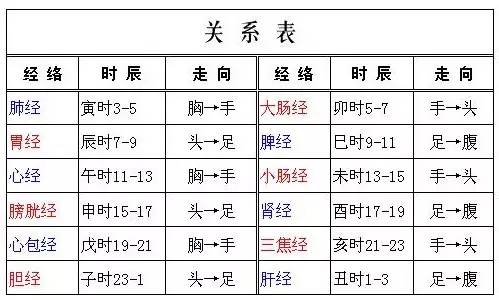
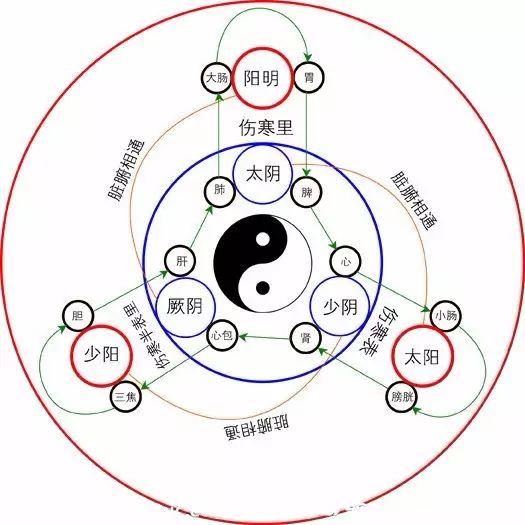
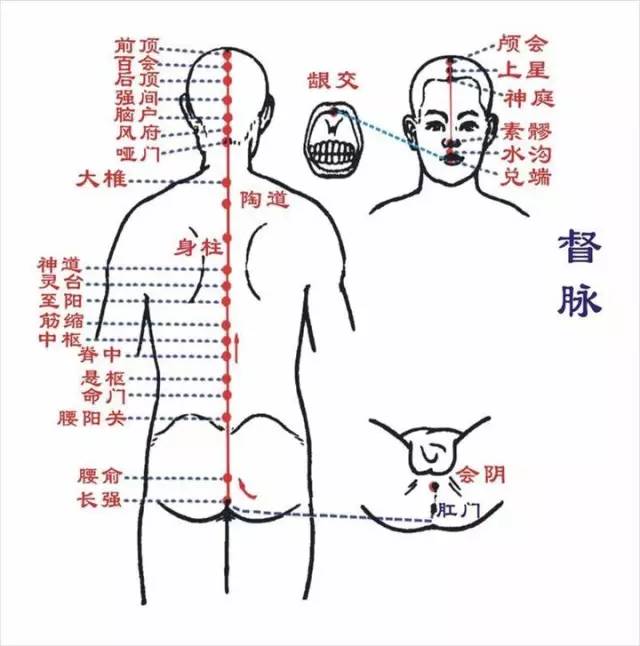
Hand Taiyin Lung MeridianThe General of the Human Body
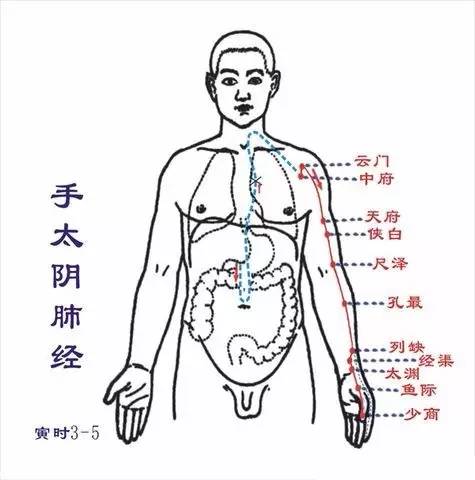
The Lung is akin to the chancellor of the body, meaning that all blood vessels in the body converge directly or indirectly in the Lung and then disperse throughout the body. So, when does the Lung start distributing Qi and blood to the entire body?
Of course, it is during the Lung Meridian’s peak at Yin time. This is when Yang energy rises, marking the transition from stillness to movement, requiring deep sleep. Without deep sleep, the Lung’s distribution of Qi and blood can be disrupted. For instance, if the brain is overly active, the Lung will allocate more Qi and blood to the brain, leading to feelings of weakness in the limbs and fatigue the next day, which is caused by Qi and blood deficiency.
The Lung Meridian is a very important meridian in the human body, with its acupoints distributed in the upper chest, the radial side of the forearm, and the radial side of the thumb. It starts at Zhongfu and ends at Shaoshang, with 11 acupoints on each side.
The Qi of the Lung Meridian is strong at Yin time (3 AM to 5 AM) — Lung Meridian is at its peak.
Sleeping soundly at Yin time, the complexion is red and the energy is abundant; “The Lung nourishes all meridians.”
After the Liver pushes fresh blood at Chou time, it provides this fresh blood to the Lung, which then distributes it throughout the body. Therefore, in the morning, if a person has a red complexion and is energetic, it indicates good health. However, if a person with Lung issues wakes up at this time, they may sweat profusely, which could indicate a problem with the Lung Meridian, such as severe coughing or asthma. If you wake up coughing at this time, it is best to drink a cup of warm water to alleviate the symptoms and relieve Lung dryness.
In daily life, many elderly people tend to wake up around four or five in the morning, which is still during Yin time, the time when the Lung Meridian transports Qi and blood. The reason elderly people wake up at this time is often due to Qi and blood deficiency. If they wake up to urinate at this time, it indicates a deficiency; if they wake up sweating profusely, it is a warning sign, as it may indicate a risk of heart disease due to Qi and blood deficiency. This is also why heart disease patients are more likely to die in the early hours of the morning.
>>>>
There are three important acupoints on the Lung Meridian:
Shizhuo (Cubital Crease), Kongzui (Palace of the Air), and Taiyuan (Great Abyss).
Shizhuo is effective for cough, asthma, hemoptysis, tidal fever, chest fullness, and throat swelling caused by Lung heat, and can also tonify the Kidney by descending Lung Qi, making it suitable for those with excess above and deficiency below. Kongzui is effective for cough and tonsillitis caused by wind-cold, while Taiyuan, the source point of the Lung Meridian, has excellent Qi tonifying effects, especially for those who feel they cannot get enough air.
>>>>
Recommended dietary choices include:
Chinese cabbage, pears, tofu, soy milk, and milk.
Deficiency symptoms: Decreased skin immunity, cold hands and feet, numbness, dry throat, cough, etc. Excess symptoms: Difficulty breathing, throat abnormalities, chest tightness, asthma, tonsillitis, cough, shoulder and back pain, and susceptibility to hemorrhoids.
Hand Yangming Large Intestine MeridianThe Guardian of the Lung and Large Intestine
In TCM, it is said that “the Lung and Large Intestine are interrelated,” meaning that the Lung governs the interior while the Large Intestine governs the exterior, and they are interconnected through the Large Intestine Meridian. In daily life, people sometimes experience throat swelling along with constipation, and we often say it is due to excessive heat, but what exactly is excessive heat?
In fact, it is the heat of the Large Intestine transmitted through the meridians to the throat connected to the Lung. In such cases, the first step is to relieve constipation; once bowel movements are regular, throat swelling will also improve. The Large Intestine Meridian starts at the tip of the index finger at Shangyang, runs along the radial side of the index finger, through Hegu and Quchi, and meets at the Dazhui point of the Governing Vessel. The Large Intestine Meridian is rich in Qi and blood; when issues arise, some may experience freckles, rosacea, diarrhea, abdominal distension, or constipation. In the upper body, symptoms may manifest as pain and discomfort along the meridian routes on the index finger, back of the hand, upper limbs, and shoulders.
Mao time (5 AM to 7 AM) — Large Intestine Meridian is at its peak.
“The Lung and Large Intestine are interrelated.” The Lung distributes fresh blood throughout the body, which then stimulates the Large Intestine to enter an excited state, completing the absorption of water and nutrients from food and expelling waste.
It is best to have a bowel movement after waking up in the morning. However, do not rush to the toilet, as many elderly people have suffered strokes due to this.
It is better to rest for 10-20 minutes to clear the mind before going.
>>>>
The main acupoints on the Large Intestine Meridian are:
Hegu (Union Valley), Shousanli (Hand Three Miles), Yingxiang (Welcome Fragrance), and Quchi (Pool at the Crook).
Hegu is the source point of the Large Intestine Meridian, commonly known as the “Tiger’s Mouth.” It is used to treat diseases of the head and face. Regularly massaging Hegu can facilitate natural healing, relieve wind and pain, and open the meridians. Hegu is particularly effective for treating gum swelling, headaches, throat swelling, and tonsillitis, and can also help alleviate menstrual pain in women, especially when combined with Sanyinjiao.
Additionally, Shousanli is particularly effective for relieving fatigue and soreness in the upper limbs. Massaging or stimulating Shousanli can also help with numbness in the upper limbs caused by cervical spondylosis. Yingxiang is a special acupoint for treating nasal congestion. When experiencing nasal congestion, runny nose, or allergic rhinitis due to a cold, massaging the Yingxiang acupoints for a minute or two can provide immediate relief. This acupoint is located at the outer edge of the nostrils.
Quchi is often used to clear heat and is very effective. If you feel irritable and have a lot of internal heat, try pressing Quchi; you will feel soreness or slight pain, and soon you will feel calm and your internal heat will decrease. It can also relieve joint soreness. For middle-aged and elderly people with high blood sugar or high blood pressure, daily massaging Quchi can help control blood pressure and blood sugar levels.
>>>>
Recommended dietary choices include:
Eggplant, spinach, bananas, mushrooms, corn, lentils, and peas. Deficiency symptoms: Abdominal pain, borborygmi, diarrhea, weakened Large Intestine function, stiff shoulders, dull skin, shoulder soreness, dry throat, wheezing, and constipation. Excess symptoms: Abdominal distension, constipation, susceptibility to hemorrhoids, discomfort or pain in the shoulder and back, toothache, and skin abnormalities.
Foot Yangming Stomach MeridianThe Foundation of Postnatal Life
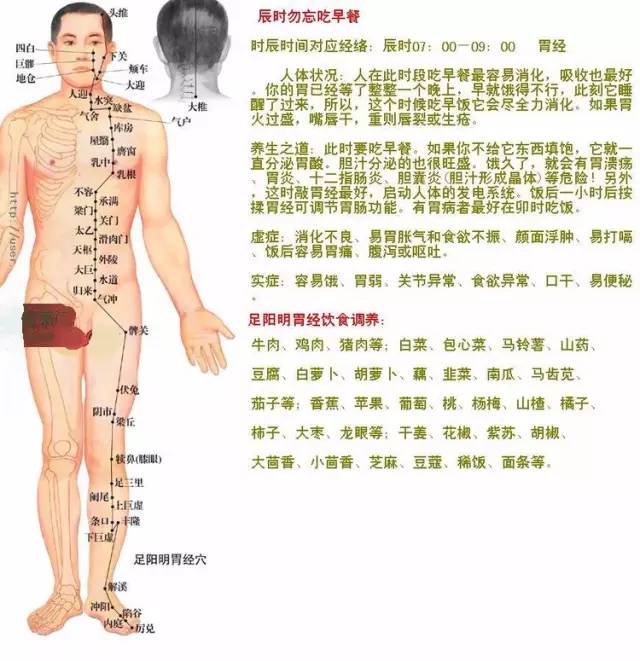
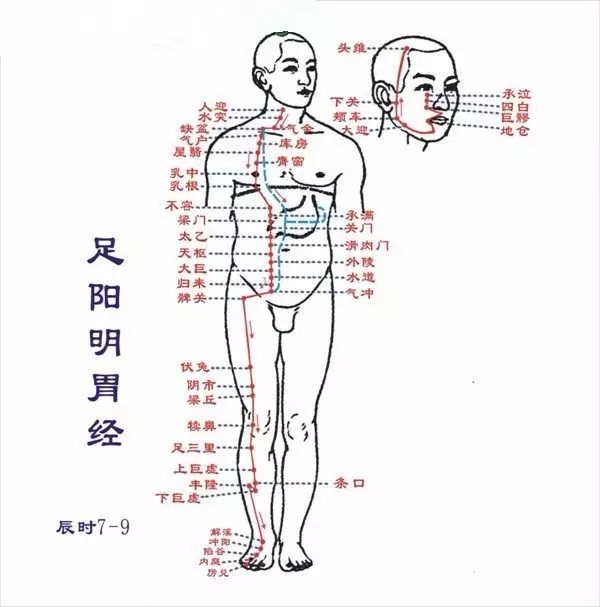
Chen time (7 AM to 9 AM) — Stomach Meridian is at its peak.
Eating breakfast during Chen time nourishes the body; food consumed during this time is the easiest to digest and absorb. Breakfast should include gentle, stomach-nourishing foods such as congee, oatmeal, and steamed buns. Foods that are too hot can lead to excessive Stomach fire, causing dry lips and sores. Skipping breakfast can lead to various diseases.
The Stomach Meridian has the most branches among the body’s meridians, mainly distributed in the head, face, chest, abdomen, and the front outer part of the legs. When issues arise in the Stomach Meridian, symptoms may include high fever, sweating, headaches, neck swelling, throat swelling, tooth pain, or facial asymmetry, and one may feel easily startled, irritable, hungry, and experience stomach and abdominal distension; knee swelling, breast, abdominal, thigh, lower limb, and dorsum of the foot pain.
>>>>
The Stomach Meridian contains the first major acupoint for health maintenance — Zusanli.
Zusanli is located four fingerbreadths below the outer knee, where the palm of your hand covers your kneecap, with the fingers pointing down; the depression at the end of the middle finger is Zusanli. Stimulating Zusanli can enhance the strength and regularity of intestinal peristalsis, increase the activity of various digestive enzymes, improve appetite, aid digestion, and also improve heart function, regulate heart rate, increase red blood cells, white blood cells, hemoglobin, and blood sugar levels, and enhance the body’s resistance to diseases.
>>>>
Another important acupoint is Tianshu:
Located about two inches to the left and right of the navel. Stimulating Tianshu is effective for constipation, indigestion, periumbilical pain, nausea, and diarrhea.
In treating the sequelae of stroke and paralysis, acupoints on the Stomach Meridian are often used. TCM states: prolonged lying harms Qi; patients who have been bedridden for a long time will definitely have poor Spleen and Stomach function, meaning the Qi of the Spleen and Stomach is severely damaged. Stimulating the Stomach Meridian can restore their Stomach Qi, and after a period of time, one will notice an improvement in appetite and muscle strength. Acupoints such as Zusanli, Liangqiu, Tianshu, Fenglong, as well as Quchi and Hegu from the Hand Yangming Large Intestine Meridian, can all help alleviate discomfort through moxibustion.
>>>>
Health tips:
It is important to have breakfast at this time. Avoid drinking fruit or vegetable juices or cold drinks first; breakfast should consist of warm foods to protect Stomach Qi. While one may not feel discomfort from cold foods initially, over time or with age, one may notice deteriorating skin, persistent throat phlegm, or frequent colds, leading to various minor ailments. This is due to long-term consumption of cold foods harming Stomach Qi. If you do not provide it with food, it will continue to secrete gastric acid. Prolonged hunger can lead to the risk of gastric ulcers, gastritis, duodenitis, and cholecystitis! Massaging the Stomach Meridian one hour after meals can help regulate gastrointestinal function.
Deficiency symptoms: Indigestion, easy bloating, loss of appetite, facial swelling, frequent belching, and post-meal stomach pain, diarrhea, or vomiting. Excess symptoms: Frequent hunger, weak stomach, abnormal joints, abnormal appetite, dry mouth, and easy constipation.
Foot Taiyin Spleen MeridianThe First Choice for Gynecological Diseases
The Spleen Meridian starts at the tip of the big toe, runs along the inner side of the foot and the boundary between the foot and the sole, ascends along the front of the inner ankle, up the inner side of the calf, intersects with the Liver Meridian, runs along the front of the inner thigh, enters the abdomen, and then passes through the space between the abdomen and chest, alongside the esophagus, and connects to the root of the tongue, dispersing under the tongue.
When the Spleen Meridian is blocked, the body may exhibit discomfort along the inner side of the big toe, the inner edge of the foot, the calf, the inner thigh, or the groin, with sensations of cold, soreness, swelling, numbness, or pain, or general weakness, pain, stomach pain, abdominal distension, loose stools, anxiety, and urgent pain under the heart.
>>>>These symptoms can be treated through the Spleen Meridian, focusing on several key acupoints:
Taibai, Sanyinjiao, Yinlingquan, and Xuehai.
Taibai is the source point of the Spleen Meridian, effective for symptoms of Spleen deficiency such as general fatigue, loss of appetite, abdominal distension, and loose stools, and can also tonify the foundation of postnatal life and enhance physical strength.
Taibai is located on the inner side of the foot, just below the big toe joint, at the junction of the foot’s back and sole.
Sanyinjiao, also known as the “Three Yin Crossing,” is effective for gynecological diseases such as dysmenorrhea, irregular menstruation, menopausal syndrome, swelling of the feet, and cold hands and feet, making it a universal remedy for gynecological issues.
Si time (9 AM to 11 AM) — Spleen Meridian is at its peak.
During Si time, the Spleen Meridian is strong, producing blood for the body; “The Spleen governs transformation and transportation, and the Spleen controls blood.” The Spleen is the master of digestion, absorption, and excretion, and also governs the blood in the body. “The Spleen opens to the mouth, and its beauty is reflected in the lips.” When the Spleen functions well, digestion and absorption are good, and blood quality is high, resulting in rosy lips. Pale lips indicate insufficient Qi and blood, while dark or purplish lips indicate cold entering the Spleen Meridian.
The Huangdi Neijing states: “The five organs transform fluids; the Heart produces sweat, the Lung produces mucus, the Liver produces tears, the Spleen produces saliva, and the Stomach produces spittle.” This means that if a person sweats abnormally, the issue may lie with the Heart; if there is excessive mucus, the Lung may be at fault; if tears are excessive, the Liver may be the source; and if saliva and spittle are excessive, the Spleen and Kidney may be the cause.
>>>>
Health tips:
When the Spleen and Stomach are not in harmony, digestion and absorption are poor, and Spleen deficiency can lead to decreased memory and other issues.
This time is when the Spleen Meridian opens and operates, making it the best time to protect the Spleen. As lunch approaches, it is recommended to cook at home and choose foods such as beef, lamb, pork, lentils, sweet potatoes, potatoes, tofu, celery, corn, and rice. Fruits can include apples, oranges, lemons, and tangerines. For beverages, green tea, herbal tea, and honey water are good choices. In daily meals, it is important to eat light foods and avoid overeating to reduce the burden on the Spleen Meridian.
Deficiency symptoms: Endocrine disorders or insufficient secretion, weak stomach, abnormal knees, insomnia, fatigue, loss of appetite, abnormal bowel movements, and abdominal distension. Excess symptoms: Disharmony of the Spleen and Stomach, poor digestion and absorption, easy abdominal bloating, belching, headaches, fatigue, abnormal knees, and abnormal bowel movements.
Hand Shaoyin Heart MeridianThe Ruler of the Human Body
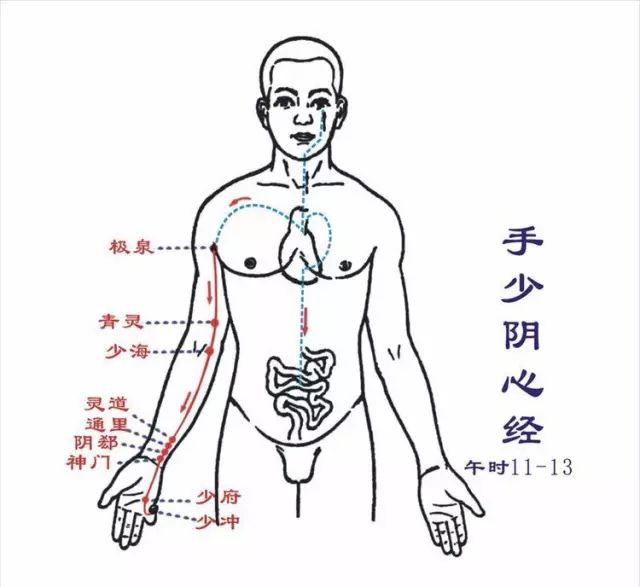
The Heart Meridian starts at the heart and is mainly distributed along the inner edge of the upper limb. When the Heart Meridian is abnormal, external symptoms may include: chest discomfort, pain, dry throat, thirst, yellowing of the eyes, side pain, and pain or numbness along the line of the arm towards the little finger. In terms of body maintenance, massaging along the meridian can relax the upper arm muscles, smooth the Qi of this meridian, and pressing and tapping key acupoints can also prevent coronary heart disease and pulmonary heart disease, as well as improve numbness in the upper limbs caused by cervical nerve compression, and can also help with insomnia. Add TCM WeChat: zyys_app for more information.
Regularly tapping the tip of the little finger to the armpit area is effective; if tapping the little arm causes soreness, and tapping the upper arm causes a tingling sensation, these are normal meridian sensations. The acupoints of this meridian are distributed in the armpit, the inner side of the upper limb, and the outer side of the little finger. It starts at the Jueyin point and ends at the Shaochong point, with 9 acupoints on each side.
Wu time (11 AM to 1 PM) — Heart Meridian is at its peak.
During Wu time, a short rest can calm the mind and nourish the Qi; “The Heart governs the spirit, opens to the tongue, and its beauty is reflected in the face.” The Heart Qi promotes blood circulation, nourishes the spirit, Qi, and tendons. During Wu time, taking a short nap is very beneficial for heart health, allowing one to be energetic from the afternoon to the evening.
>>>>
Health tips:
This is the time when the Heart Meridian opens and operates. After meals, we often feel the urge to sleep, but due to various reasons, we suppress this desire. If possible, a short nap of just 10 minutes can greatly benefit the heart, and there is no need to worry about gaining weight since the time is short; it can also help with gastrointestinal peristalsis and reduce the burden.
Additionally, one can choose foods beneficial for the heart, such as eating a tomato before meals, and fruits like apples and grapes, with beverages like black tea, green tea, and herbal tea, along with red beans, sweet potatoes, golden needles, and chicken.
Foot Taiyang Bladder MeridianThe Water Official of the Body, Running Precious Body Fluids
The Foot Taiyang Bladder Meridian starts at the inner corner of the eye at Jingming and ends at the tip of the little toe at Zhiyin, running through the head, neck, back, and legs, with 76 acupoints on each side, making it the meridian with the most acupoints among the fourteen meridians.
Shen time (3 PM to 5 PM) — Bladder Meridian is at its peak.
The Bladder Meridian is the largest detoxification pathway in the body, constantly transmitting toxins, while other pathways such as the Large Intestine for bowel movements, pores for sweating, and the feet for expelling dampness, as well as the trachea for expelling phlegm, tears, acne, and vomiting, are all partial pathways that ultimately converge in the Bladder Meridian. Therefore, to eliminate toxins from the body, the Bladder Meridian must be unobstructed.
>>>>
There are several useful acupoints on the Bladder Meridian.
1. Jingming is effective for hiccups; pressing both sides of Jingming simultaneously can create a strong sour sensation, which can effectively suppress hiccups. It is also a good acupoint for self-care of the eyes.
2. Weizhong is effective for all diseases and discomforts in the lumbar region and back, and stimulating Weizhong can provide good relief, as well as treat soreness in the legs, soft tissue diseases around the knee, and lower limb weakness, and can also be used for the care of sequelae from stroke and paralysis.
3. Chengshan is mainly used to treat hemorrhoids and relieve muscle fatigue and back pain, and is also effective for constipation, especially for treating soreness and cramps in the calves after climbing or prolonged exercise.
>>>>
Health tips:
The Bladder is most active at this time, so it is advisable to drink more water.
When feeling the urge to urinate, do not hold it in; otherwise, it may lead to conditions such as urinary retention. This means that the bladder sphincter may lose elasticity.
Dietary recommendations: Black fungus, black sesame, black beans, pepper, and chicken.
Hand Taiyang Small Intestine MeridianThe Key to Calming the Mind and Relaxing the Muscles
Let’s first understand a phenomenon: many people work all day in front of a computer, often experiencing shoulder soreness. If not treated, this can develop into back pain, neck stiffness, and numbness in the hands. Hospitals often diagnose these symptoms as cervical spondylosis, but in fact, this is due to insufficient blood supply to the heart, leading to Qi and blood deficiency in the Small Intestine. Some may wonder how insufficient blood supply to the heart relates to the Small Intestine. This is because the heart and Small Intestine are interrelated, connected through the meridians.
If there is a problem with the heart, the Small Intestine will show signs. To check if your heart’s blood supply is sufficient, there is a simple method: below the elbow, there is a nerve; this nerve is the pathway of the Small Intestine Meridian. You can punch this nerve and see if it causes numbness in the little finger. If it feels numb all the way, it indicates that your heart’s blood supply is good; if it only hurts without numbness, it indicates that your heart may have insufficient blood supply.
The acupoints of this meridian are distributed on the fingers, the ulnar side of the palm, the outer side of the upper limb, the shoulder, and the face. It starts at Shaoze and ends at Tinggong, with 19 acupoints on each side.
Wei time (1 PM to 3 PM) — Small Intestine Meridian is at its peak.
During Wei time, the Small Intestine separates the clear from the turbid, and drinking water can reduce heat; the Small Intestine separates the clear from the turbid, sending water to the Bladder and waste to the Large Intestine, while the essence is sent to the Spleen. The Small Intestine Meridian adjusts the nutrition of the body throughout the day. If there is heat in the Small Intestine, one may experience dry cough and flatulence. At this time, drinking water or tea is beneficial for the Small Intestine to expel heat.
>>>>
Health tips:
During the operation of the Small Intestine Meridian, sub-health may manifest as diarrhea, decreased absorption, neck pain, headaches, tinnitus, rheumatism, etc. If symptoms such as lower abdominal bloating or pain, excessive sweating, and constipation occur, one should pay attention to their health. In terms of diet, it is advisable to choose foods such as red beans, watermelon, pumpkin, winter melon, and chicken.
Foot Shaoyin Kidney MeridianThe Foundation of Life
The Foot Shaoyin Kidney Meridian has 27 acupoints, starting at the Yongquan (Gushing Spring) on the sole of the foot and ending at the Yufu (Kidney Shu) below the collarbone. It mainly runs along the inner side of the lower limbs and the front of the trunk, along the midline on both sides. Since the Kidney Meridian is closely related to the kidneys, maintaining the vitality of the Kidney Meridian and ensuring smooth Qi and blood flow is beneficial for beauty, energy, and harmonious sexual life.
When issues arise in the Kidney Meridian, the body may exhibit symptoms such as dry mouth, hot tongue, throat swelling, irritability, and easy fright; additionally, there may be chest pain, lower limb weakness or muscle atrophy, a dull complexion, and dizziness. To improve these symptoms, one can stimulate along the Kidney Meridian, as it connects to many organs. Stimulating key acupoints on the Kidney Meridian, such as Taixi (Great Stream) and Yongquan, can also be beneficial.
Taixi is the residence of the original Qi of the kidneys, with functions of nourishing Kidney Yin, tonifying Kidney Qi, and strengthening Kidney Yang, which can alleviate issues related to the reproductive system, Kidney Yin deficiency, lower back pain, and lower limb dysfunction. Taixi is also effective for various pharyngitis, especially for those with dry and swollen throats due to Kidney Yin deficiency. For those with lower back pain and weakness, massaging Taixi can provide immediate relief.
Yongquan is one of the second longevity acupoints in the body, effective for treating oral ulcers, hypertension, angina, gray hair, allergic rhinitis, and rough skin.
You time (5 PM to 7 PM) — Kidney Meridian is at its peak.
During You time, it is advisable to have dinner, which should be light, and one may drink a small glass of wine, but should not get drunk. Washing the feet with hot water can reduce heat, invigorate blood circulation, and eliminate dampness. “The Kidney stores reproductive essence and the essence of the five organs.” After the Bladder has expelled heat and toxins during Shen time, the Kidney enters a phase of storing essence during You time. It is not advisable to engage in strenuous exercise or drink large amounts of water at this time.
>>>>
Health tips:
For those with Kidney function issues, massaging the acupoints on the Kidney Meridian at this time can be most effective.
This is the time when the Kidney Meridian opens and operates. In terms of diet, it is advisable to choose foods such as sesame, bananas, peanuts, kelp, golden needles, leeks, soybeans, black fungus, crabs, chicken, goat milk, and sweet potatoes.
Hand Jueyin Pericardium MeridianProtecting the Heart
Xu time (7 PM to 9 PM) — Pericardium Meridian is at its peak.
During Xu time, protect the heart and relieve stress; “The Pericardium is the outer membrane of the heart, containing vessels and pathways for Qi and blood. Evil cannot reside here, as it would harm the heart.” The Pericardium is the protective tissue of the heart and also a pathway for Qi and blood. The Pericardium Meridian is most active during Xu time, clearing external evils from around the heart and keeping it in good condition. It is essential to maintain a pleasant mood: read, listen to music, do spa treatments, dance, or practice Tai Chi to relax and relieve stress.
The Pericardium Meridian starts from the outer side of the heart, reaching three inches below the armpit, then runs along the middle of the inner side of the arm, ending at the middle finger. Regularly tapping the Pericardium Meridian is effective for relieving depression and stress. When stimulating the Pericardium Meridian, first locate a large tendon under the armpit, then pinch and stimulate it; you will feel tingling in the little and ring fingers.
After the age of 35, it becomes even more necessary to stimulate the Pericardium Meridian. Unhealthy eating habits and lifestyles can lead to increased cholesterol and fat levels in the blood, and when cholesterol levels are too high, it can adhere to the walls of blood vessels, causing narrowing and reduced elasticity, leading to poor blood flow and various cardiovascular diseases. Stimulating the Pericardium Meridian can accelerate blood flow and help remove cholesterol from the vessel walls.
There is an important acupoint on the Pericardium Meridian — Laogong. Laogong is the most sensitive acupoint in the body, and nourishing the heart through Laogong is very effective. If you feel nervous in certain situations, with sweaty palms, rapid heartbeat, and difficulty breathing, pressing the Laogong acupoint on the left hand can help restore confidence.
Additionally, the Neiguan acupoint on the Pericardium Meridian has the effects of “calming the mind, regulating Qi, relieving pain, and harmonizing the stomach.” Spending about two minutes massaging it with moderate pressure until you feel soreness can effectively relieve stomach Qi rising.
>>>>
Health tips:
Now is the time when the Pericardium Meridian operates. Deficiency symptoms of the Pericardium Meridian often manifest as insufficient lubrication, abnormal heartbeat, shortness of breath, insomnia with vivid dreams, palpitations, and excessive sweating in the palms. Those with heart issues should stimulate the Pericardium Meridian at this time for the best results. It is essential to create a peaceful environment for sleep. Avoid vigorous exercise, as it may lead to insomnia. Gentle walking is the best form of exercise.
Dietary recommendations: Tomatoes, lotus seeds, golden needles, red dates, apples, grapes, black tea, green tea, herbal tea, sweet potatoes, potatoes, and chicken.
Hand Shaoyang San Jiao MeridianDefending Mental Safety
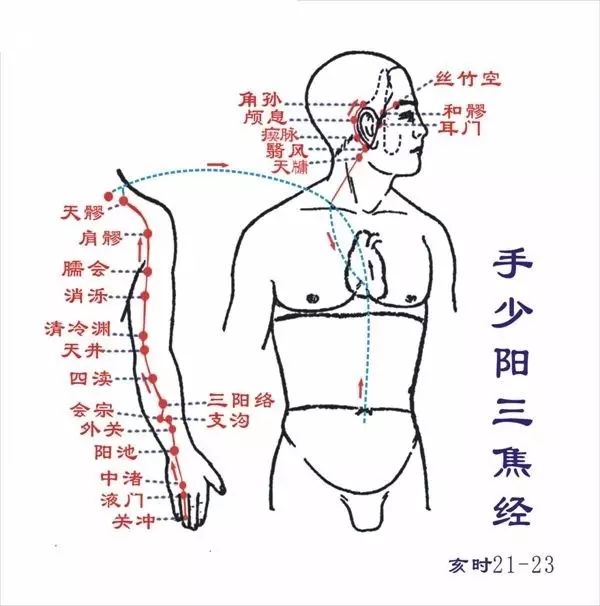
The San Jiao Meridian is mainly distributed on the outer side of the upper limb, as well as the shoulder and side of the head. It is also known as the ear meridian, as it circles around the ear. Therefore, ailments of the ear can be alleviated by stimulating this meridian, such as deafness, tinnitus, and ear pain. When tapping, a sensation of soreness is ideal, as it can regulate the circulation of body fluids, enhance immunity, stimulate the cerebral cortex, relax the nerves, and alleviate symptoms such as headaches, throat pain, and sweating.
The endpoint of the San Jiao Meridian is at the Sizhukong, which is located at the outer corner of the eye. The crow’s feet are located here, and many women love to apply makeup to this area to prevent dark spots. Therefore, regularly stimulating the San Jiao Meridian can reduce crow’s feet and prevent dark spots. The acupoints of this meridian are distributed on the outer side of the ring finger, the back of the hand, the middle outer side of the upper limb, the shoulder, the neck, the back of the ear, and the outer end of the eyebrow. It starts at Guanchong and ends at Sizhukong, with 23 acupoints on each side.
Hai time (9 PM to 11 PM) — San Jiao Meridian is at its peak.
During Hai time, all meridians are connected, nourishing the body and enhancing beauty. The San Jiao is the largest of the six Fu organs, responsible for managing Qi and regulating water pathways. During Hai time, the San Jiao can connect all meridians. If a person sleeps during Hai time, all meridians can rest and rejuvenate, which is very beneficial for the body and beauty. A common trait among centenarians is that they sleep during Hai time. If modern people do not wish to sleep at this time, they can listen to music, read, watch TV, or practice yoga, but it is best not to stay awake past Hai time.
>>>>
Health tips:
At this time, it is essential to maintain a calm mind. Avoid anger, excessive joy, or deep sadness.
If you have had a serious argument with your spouse at night and are still upset by 11 PM, you will definitely feel exhausted the next day.
Foot Shaoyang Gallbladder MeridianAll for Digestive Function
Zi time (11 PM to 1 AM) — Gallbladder Meridian is at its peak.
Sleeping well during Zi time prevents dark circles; TCM theory states: “The excess Qi of the Liver is released into the Gallbladder, where it is concentrated and refined.” If a person sleeps before Zi time, the Gallbladder can complete its metabolism. “The clearer the bile, the clearer the mind.” Those who sleep before Zi time will wake up with a clear mind and rosy complexion, without dark circles. Conversely, those who cannot sleep during Zi time will have a pale complexion and dark circles, and poor bile metabolism can lead to the formation of crystals and stones.
The Gallbladder Meridian is the longest pathway in the body, running along both sides from the head to the neck, then down to the waist, legs, and feet. Each side has 44 acupoints, such as Fengchi, Jianjing, Huantiao, and Yanglingquan. Following the meridian can certainly improve the flow of Qi and blood; the method of stimulation may vary, but the effects are the same.
In TCM, the Gallbladder has a decisive function; when the Gallbladder Qi is abundant, one acts decisively, and the functions of the organs and blood flow are normal; conversely, when Gallbladder Qi is insufficient, one may feel indecisive. The area where one feels indecisive is where the Gallbladder Meridian runs; scratching the head stimulates the Gallbladder Meridian to help with decision-making. Additionally, when fatigued, people often raise their arms, which stretches the Gallbladder Meridian to invigorate Yang energy; yawning also indicates the release of Gallbladder Qi. Some people frequently experience a bitter taste in the mouth, migraines, or sciatica, and these symptoms often occur in areas where the Gallbladder Meridian runs.
>>>>
Health tips:
Clinical evidence shows that most heart disease patients experience symptoms and even death at night.
If there are heart disease patients at home, it is essential to monitor them closely and have heart-saving pills ready.
At this time, it is advisable to go to bed, which is beneficial for bone marrow production.
Those who sleep before Zi time will wake up with a clear mind and rosy complexion.
Dietary recommendations: Peanuts, sesame, walnuts, grapes, bananas, tomatoes, lotus root, leeks, black fungus, crabs, chicken, and kelp.
Foot Jueyin Liver MeridianSleeping Well During Chou Time Protects the Liver
Chou time (1 AM to 3 AM) — The Qi and blood of the Liver Meridian are at their peak.
At this time, the body’s Yin energy begins to decline, and Yang energy begins to rise, so one should rest quietly to align with nature and better support the work of the Liver Meridian. Additionally, those with excessive internal heat can benefit from sleeping during this time, as it can help reduce internal heat. Many people with hepatitis or fatty liver suffer because they do not pay attention to liver health during Chou time.
TCM theory states: “The Liver stores blood.” “When a person sleeps, blood returns to the Liver.” If one cannot sleep during Chou time, the Liver will continue to expend energy to support thinking and action, failing to complete metabolism. Therefore, those who cannot sleep before Chou time will have a pale complexion, sluggish emotions, and may develop liver diseases, with symptoms such as diarrhea, vomiting, dry throat, and a dull complexion. TCM states that the heart governs the spirit, and the liver governs the soul; at night, both the spirit and soul should return, but if the spirit returns and the soul does not, it is called “the soul does not guard the spirit.” The solution is to massage the Liver Meridian to help the soul return.
The Liver Meridian has 14 acupoints, running from the foot up, starting at the inner side of the big toe, moving up to the ankle, then along the inner side of the leg, around the reproductive organs, and reaching the ribcage. Massaging along the Liver Meridian can nourish Liver Qi and resolve insomnia issues. This can be done during the peak time of the Hand Jueyin Pericardium Meridian, which can also stimulate the Liver Meridian.
Unblocking the Liver Meridian to Alleviate Insomnia
There is an important acupoint on the Liver Meridian — Taichong, located at the junction of the big toe and the second toe, in the depression at the highest point of the foot. It is a special acupoint for treating various liver diseases, capable of lowering blood pressure, calming the liver, clearing heat, and benefiting the eyes, similar to the effects of chrysanthemum in herbal medicine, and is also effective for women with menstrual irregularities. Stimulating Taichong before sleep can help calm the mind and promote restful sleep.
Many women may experience sudden yellowing of the complexion, irritability, and a tendency to argue with others, which is often a sign of insufficient Liver blood. When Liver blood is insufficient, the skin lacks nourishment, leading to a dull complexion, dry eyes, and blurred vision. If one remains in a state of Liver Qi stagnation for a long time, it may lead to breast hyperplasia and other breast diseases.
Official website: ww.tjqydcjh.com
We welcome contributions from netizens (original or reprinted articles about Tai Chi culture)
Submission email: [email protected]
Contact number: 15369006196
What do you think after reading this?
Feel free to click the lower left corner Read the original
A gathering place for Tai Chi enthusiasts
More exciting with you
